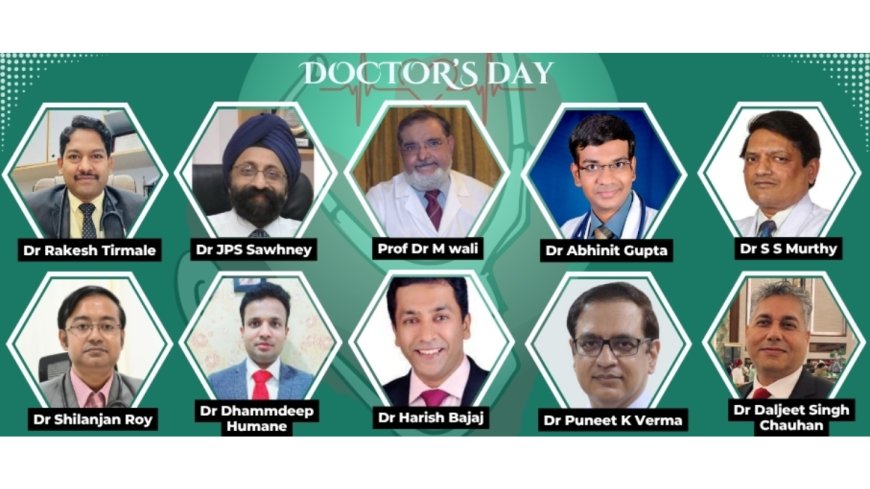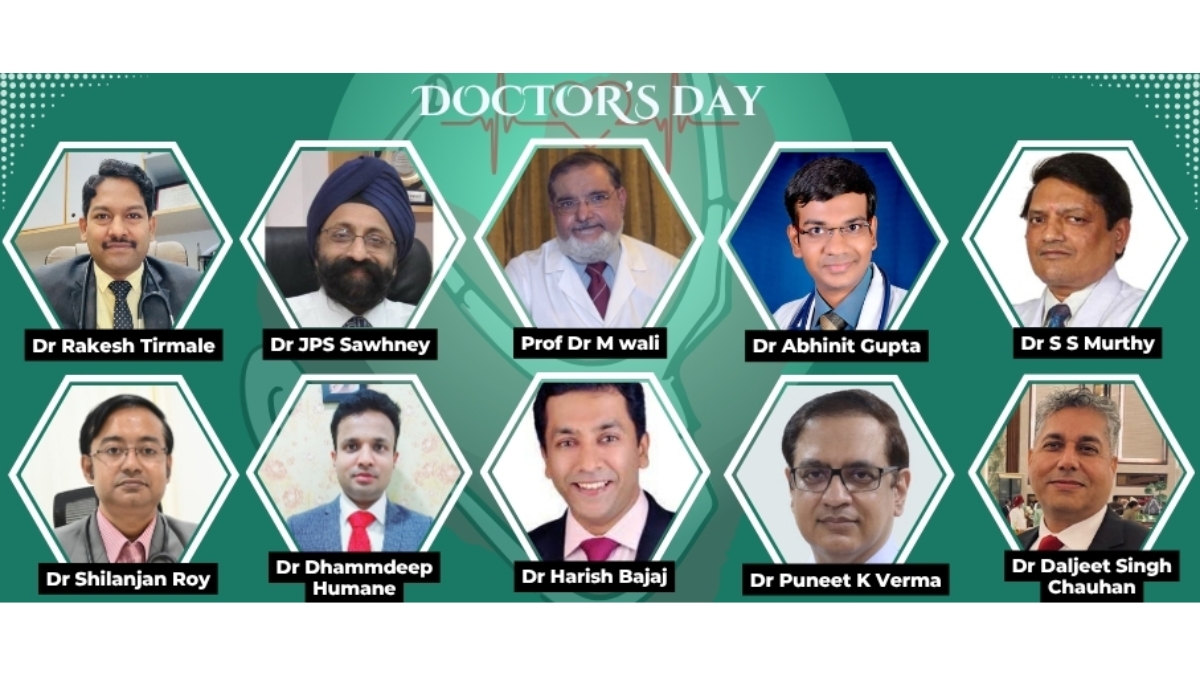Doctors’ Day 2025: Advice from Best Cardiologists on the Rise of Heart Issues in Young Adults
New Delhi [India], July 1 :As we observe Doctors’ Day 2025, it is not only a moment to celebrate the dedication and contributions of our medical professionals but also an opportunity to spotlight pressing health concerns affecting today’s generation. One alarming trend that continues to gain attention is the rise of heart-related issues among young [...]


New Delhi [India], July 1 :As we observe Doctors’ Day 2025, it is not only a moment to celebrate the dedication and contributions of our medical professionals but also an opportunity to spotlight pressing health concerns affecting today’s generation. One alarming trend that continues to gain attention is the rise of heart-related issues among young adults. Once considered a concern primarily for older populations, cardiovascular conditions are increasingly being diagnosed in individuals in their 20s and 30s. Sedentary lifestyles, stress, poor dietary habits, and lack of regular screenings have contributed to this growing health crisis. In this special feature, some of India’s leading cardiologists share their expert advice, insights, and preventive strategies to help young adults take charge of their heart health before it’s too late. Their guidance is a timely reminder that awareness, early action, and lifestyle choices can make all the difference.
1. Dr S S Murthy, Director & HOD – Cardiology, Ayushman Hospital and Health Services, Dwarka, New Delhi
Dr S. S. Murthy highlights a growing concern this Doctors’ Day: the alarming rise of heart issues in young adults aged 20–44. He notes that increasing rates of obesity and diabetes are major contributors—between 2009 and 2020, obesity rose from 32.7% to 40.9%, while diabetes cases climbed from 3% to 4.1%. Hypertension affects nearly 1 in 10 young adults, often going undetected and causing long-term damage to the heart and blood vessels.
He also points to smoking and vaping as critical risk factors. Smoking a pack a day doubles heart attack risk, while vaping increases it by 34%. Chronic stress, sedentary habits, and genetic predisposition further compound the risk, as do post-COVID complications, which have been linked to a 30% rise in heart attack deaths in young adults.
To prevent heart disease, Dr Murthy advises young adults to maintain a healthy weight, avoid smoking or vaping, manage stress effectively, and undergo regular health check-ups to monitor key cardiovascular indicators.
2. Prof. (Dr) M. Wali, MD FRCP FACC (USA), Sir Ganga Ram Hospital, New Delhi
Sudden Cardiac Death (SCD) is increasingly affecting young, seemingly healthy individuals. Genetic conditions like Long QT Syndrome, Brugada Syndrome, and post-COVID complications have heightened the risk, especially when compounded by lifestyle factors and undetected heart issues. India, with a high prevalence of heart disease and limited data, is witnessing over 700,000 sudden deaths annually, many among the economically productive population. Notable recent cases include athletes, actors, and students. What is this happening and why is this happening – we have to find answer soon.
Warning signs—such as chest pain, breathlessness, or fatigue—should not be ignored, particularly post-COVID. Preventive strategies include a balanced diet, antioxidant use, exercise, intermittent fasting, and routine heart screenings. Diagnosis can be challenging due to microclotting, which masks lab markers, making advanced tests like thromboelastography essential. Timely CPR and AED use can save lives. Greater awareness, improved emergency response, and public health efforts are vital to reduce the burden of SCD in India and globally.
3. Dr Rakesh Tirmale, MD, DM( Cardio), FSCAI (USA), AFESC (Europe), TERNA SUPERSPECIALITY HOSPITAL, NAVI MUMBAI
Dr Rakesh Tirmale emphasizes the growing concern around the rise of heart issues in young adults, attributing it to a combination of unhealthy lifestyle choices, chronic stress, substance use, and genetic predisposition. Poor dietary habits, lack of physical activity, and increasing mental health challenges have led to a surge in conditions such as hypertension, dyslipidemia, and even premature heart attacks. To counter this trend, Dr Tirmale advocates for the adoption of a heart-healthy lifestyle starting early. He recommends a balanced diet rich in fruits, vegetables, whole grains, and healthy fats, while minimizing salt and sugar intake. Regular physical activity—at least 150 minutes of moderate-intensity aerobic exercise per week—is essential, along with staying active throughout the day. Managing stress through mindfulness practices, yoga, and adequate sleep also plays a crucial role in heart health. Dr Tirmale strongly advises avoiding harmful substances like tobacco and excessive alcohol. Routine health check-ups, particularly for blood pressure and cholesterol, along with timely medical consultation for symptoms like chest discomfort or fatigue, are vital for prevention and early intervention.
4. Dr Abhinit Gupta- MD, DM (AIIMS, Delhi) Gold Medalist, FIACM, FSCAI, Associate Director, Cardiology at Regency Health, Kanpur
India is witnessing an unprecedented rise in cardiovascular issues among individuals in their 20s to early 40s. Recent media reports emphasize that young professionals—especially in urban areas—are increasingly falling prey to heart attacks, hypertension, and sudden cardiac events high pressure work cultures, erratic meal routines, junk food reliance, alcohol use, chronic stress, and minimal physical activity are fueling this trend—often labeled the “deadline diet” lifestyle.
Key Drivers behind these trends are Metabolic and lifestyle factors, Genetic predisposition & environment, sedentary behavior & stress, sudden cardiac events and Silent conditions—such as atherosclerosis or structural heart issues—can lead to abrupt cardiac arrests.
Start regular check-ups in the 30s, including BP, lipid profile, blood sugar, and waist circumference. Incorporate moderate exercise (30 45 min/day), balanced meals low in processed foods, quality sleep, and sustainable stress management such as meditation. Avoiding tobacco & alcohol and Public awareness & systemic change can prevent heart diseases.
5. Dr Dhammdeep Humane, MBBS, MD (MED), DM – Cardiology, DNB (Cardiology), FSCAI (USA), AFESC (Europe), Consultant Interventional Cardiologist, Start Health Clinic, Mumbai
Heart attacks are increasingly being reported among young adults—a trend that was once considered rare. This alarming rise is due to a combination of lifestyle changes, genetic predispositions, and underlying health conditions. Unhealthy lifestyle choices are among the leading contributors. Diets high in processed foods, sugary beverages, and unhealthy fats can result in weight gain, high cholesterol, and diabetes—all major risk factors for heart disease. A sedentary lifestyle, especially common among desk-job professionals, further exacerbates this risk. Additionally, smoking and substance abuse—such as the use of nicotine, cocaine, or amphetamines—can severely strain the heart.
Genetic factors also play a significant role. A family history of early-onset heart disease increases one’s susceptibility, and conditions such as high blood pressure, elevated cholesterol, diabetes, and even PCOS (in women) can heighten the risk. Stress and mental health issues are equally important. Chronic stress increases inflammation and cortisol levels, while depression and anxiety can negatively affect heart function. Environmental elements like air pollution and a lack of awareness about symptoms can also delay necessary medical care. Furthermore, certain medications and supplements may have cardiovascular side effects, adding another layer of risk for the young population.
Watch the video from expert cardiologists on insights on rising heart issues in young adults: https://www.youtube.com/watch?v=UgxySMy3ECY
6. Dr Shilanjan Roy, MBBS, MD(Med), MRCP(UK), DM(Cardiology), FSCAI(USA) Senior Consultant Cardiologist, Charnock Hospital, Kolkata
Dr Shilanjan Roy, Senior Consultant Cardiologist at Charnock Hospital, Kolkata, highlights the alarming rise in coronary artery disease among young adults in India. He attributes this growing concern to a mix of unhealthy lifestyle habits, rising stress levels, substance abuse, and genetic predisposition. Factors such as poor diet, sedentary behavior, and unaddressed mental health issues are fueling an increase in conditions like hypertension, dyslipidemia, diabetes, obesity, and even early heart attacks. To reduce these risks, Dr Roy emphasizes the importance of lifestyle modifications. He recommends a balanced diet rich in fruits, vegetables, whole grains, and healthy fats, while limiting salt and sugar intake. At least 150 minutes of moderate aerobic exercise weekly—such as walking, swimming, or cycling—alongside light strength training two to three times a week, can support heart health. Stress should be managed through mindfulness practices, yoga, pranayama, and adequate sleep. He also strongly advises quitting tobacco in all forms and limiting alcohol consumption. Regular health check-ups and timely medical attention for symptoms like chest pain or fatigue are vital for prevention and early intervention.
7. Dr Daljeet Singh Chauhan, M.D., Senior Consultant
Rising heart issues among young adults are linked to lifestyle factors such as unhealthy diet, sedentary behaviour, stress, and substance abuse. We recommend early screening for risk factors, including high blood pressure, cholesterol, and family history. Maintaining a balanced and healthy diet low in processed foods and saturated fats, engaging in regular physical activity, and avoiding smoking and excessive alcohol can significantly reduce cardiac risks. Managing stress through mindfulness, adequate sleep, and social support is also crucial. Additionally, awareness about the dangers of illicit drug use, especially stimulants, is vital. Young adults should prioritize heart health by adopting a proactive approach, healthy lifestyle, seeking medical advice if experiencing symptoms like heaviness in chest, chest pain, shortness of breath, or palpitations. Early intervention and lifestyle modifications can prevent severe cardiac conditions, emphasizing the importance of education and regular health check-ups to curb this alarming trend in young adults.
8. Dr Harish Bajaj, MBBS, MD, DM Cardiology (KEM Hospital, Mumbai), Fellow in Interventional Cardiology, Mumbai
Average life expectancy in India is around 70 years, almost 10 to 20 years lesser than developed countries. Commonest reasons are heart attack, cancer, stroke, diabetes mellitus, lung diseases etc. Major risk factors are higher bad cholesterol (sr. LDL), higher blood pressure, Tobacco consumption, uncontrolled blood sugar levels. It is advised that anyone who gets chest discomfort, breathlessness, sweating or uneasiness on exertion, should check up their cardiac status. It includes ECG, 2 D echo, Treadmill test, Stress thallium, maybe CT or catheter coronary angiogram. If indicated coronary angioplasty or coronary bypass artery graft surgery should be done. It is important to repair your heart before any damage happens. Please preserve your left ventricular ejection fraction and check if it’s around 60%, keep Sr. LDL cholesterol below 70 mg/dl, keep blood pressure below 130/80 mm hg. Keep post prandial blood sugar levels below 180 mg/dl and HBA!C below 7, do not consume tobacco in any form. Do regular checkups, exercises, low cholesterol / salt / sugar diet. Please aim to live healthy above 90 years of age.
9. Dr Puneet K Verma, Chief Interventional Cardiologist cum Structural Heart Specialist, Ace Heart and Vascular Institute, Mohali
Alarming trends indicate a surge in heart disease among young individuals. Sedentary lifestyles, poor dietary habits, and increasing stress levels are contributing factors. According to recent studies, heart attacks and strokes are being reported in people under 40, a demographic previously considered low-risk. Experts attribute this trend to rising obesity, diabetes, and hypertension rates among young adults. Lack of physical activity, excessive screen time, and unhealthy eating habits exacerbate the problem.
Early detection and prevention are crucial. We recommend regular check-ups, healthy lifestyle choices, and stress management to mitigate risks. Parents and educators must promote healthy habits among children and adolescents. By taking proactive steps, we can reduce heart disease’s burden and ensure a healthier future. Awareness and action are key. Encouraging physical activity, balanced diets, and regular health monitoring can help prevent heart disease. By working together, we can reverse this alarming trend and promote a healthier generation.
10. Dr JPS Sawhney, MBBS, MD – Medicine, DM – Cardiology, Senior Consultant Cardiologist and Chairman of Cardiology at Sir Ganga Ram Hospital, Delhi
Dr JPS Sawhney, a leading cardiologist based in Delhi, highlights a deeply concerning trend: India is witnessing heart attacks in young adults nearly a decade earlier than in Western countries. According to Dr Sawhney, this early onset of cardiovascular disease is primarily driven by the earlier acquisition of risk factors such as hypertension, diabetes, and lipid abnormalities. A significant contributor is the high prevalence of metabolic syndrome in India—marked by central (truncal) obesity and a distinctive lipid profile characterized by high triglycerides, low HDL, and small dense LDL particles. Additionally, unique lifestyle habits such as tobacco chewing and bidi smoking significantly elevate cardiovascular risk. Genetic predisposition also plays a key role, with a higher incidence of familial hypercholesterolemia and elevated lipoprotein(a) [Lp(a)] levels in the Indian population compared to the West. Dr Sawhney emphasizes the urgent need to improve lifestyle choices, including increasing physical activity, adopting healthier cooking methods, and reducing carbohydrate and sugar consumption to combat the growing burden of heart disease in young Indians.
If you have any objection to this press release content, kindly contact [email protected] to notify us. We will respond and rectify the situation in the next 24 hours.







